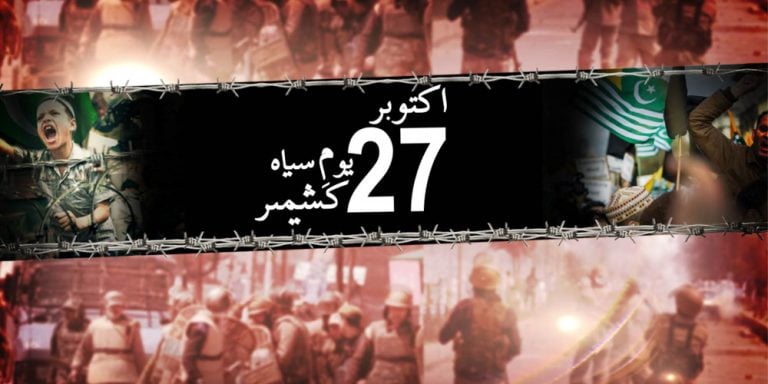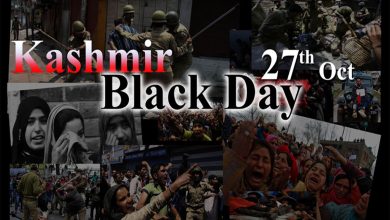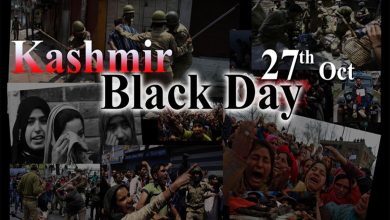
 October 27, 1947, is a day etched in the collective memory of Kashmiris as Black Day, marking the beginning of a decades-long conflict and struggle for self-determination. On this day, Indian forces invaded in Srinagar following Maharaja Hari Singh’s controversial signing of the Instrument of Accession to India on October 26. The historical backdrop to this event can be traced to the Muslim Conference Resolution, passed on July 19, 1947. This resolution reflected the overwhelming desires of the majority Muslim population in Jammu and Kashmir, urging Maharaja Hari Singh to accede to Pakistan, based on the state’s cultural, religious, and economic ties. At a time when India was being partitioned into two independent states, the political landscape was charged with uncertainty, and princely states like Jammu and Kashmir were at a crossroads. The Muslim Conference Resolution was a clear expression of Kashmiris’ shared identity and long-standing aspirations for self-determination.
October 27, 1947, is a day etched in the collective memory of Kashmiris as Black Day, marking the beginning of a decades-long conflict and struggle for self-determination. On this day, Indian forces invaded in Srinagar following Maharaja Hari Singh’s controversial signing of the Instrument of Accession to India on October 26. The historical backdrop to this event can be traced to the Muslim Conference Resolution, passed on July 19, 1947. This resolution reflected the overwhelming desires of the majority Muslim population in Jammu and Kashmir, urging Maharaja Hari Singh to accede to Pakistan, based on the state’s cultural, religious, and economic ties. At a time when India was being partitioned into two independent states, the political landscape was charged with uncertainty, and princely states like Jammu and Kashmir were at a crossroads. The Muslim Conference Resolution was a clear expression of Kashmiris’ shared identity and long-standing aspirations for self-determination.
However, Maharaja Hari Singh signed the Instrument of Accession to India without the consent or will of the people of Kashmir, rendering it both illegal and controversial. The subsequent military invasion by India on October 27 laid the foundation for a protracted and bloody conflict that continues to shape the lives of millions in Kashmir. This intervention not only violated the Kashmiris’ rights but also perpetuated a legacy of occupation, suffering, and a persistent fight for justice and self-determination that resonates to this day.
India took this matter to the United Nations the UN demanded a plebiscite to ascertain the Kashmiri people’s will over their political destiny. Resolution 47 of the United Nations Security Council was passed in April 1948 and specifically mentioned the withdrawal of military forces by both India as well as the holding of a plebiscite to provide Kashmiris the option of joining either country. Sadly, these decisions supporting a fair and free plebiscite have not been put into effect, leaving Kashmiris worried about their political future.
In the aftermath of this illegal accession, tensions escalated rapidly, leading to one of the darkest chapters in Kashmir’s history, the Jammu Massacre of 1947. As communal violence spread, an estimated 200,000 to 237,000 Muslims in the Jammu region were brutally killed by forces loyal to Maharaja Hari Singh, with the support of right-wing Hindu groups and Sikh militias. The violence forced hundreds of thousands of Muslims to flee to Pakistan, permanently altering the demographics of the region. This massacre is a ugly reminder of the cost of political maneuvering and how the Kashmiri people’s demand for self-determination was met with violence instead of dialogue.
The Jammu Massacre deepened the resentment and mistrust that had already been brewing due to India’s military intervention in Kashmir. India initially sought UN intervention, leading to several resolutions that supported the Kashmiri people’s right to self-determination through a plebiscite. However, as time passed, India shifted its stance, declaring Kashmir an integral part of its territory, abandoning the promises made to Kashmiris under international law.
This betrayal culminated in the abrogation of Article 370 on August 5, 2019, which stripped Jammu and Kashmir of its special autonomous status. This unilateral move heightened fears of demographic changes intended to weaken the Muslim majority and resulted in an upsurge of human rights violations. The region has since seen an increase in extrajudicial killings, mass detentions, and curfews, further fueling the Kashmiri people’s longstanding struggle for justice and self-determination. The ongoing repression continues to reflect the unresolved nature of the conflict, rooted in the illegal accession and the failure to honor Kashmiris’ right to decide their own future.
It is imperative that both national and international organizations take immediate and concrete steps in response to these ongoing violations. Accountability mechanisms must be established to investigate allegations against Indian forces stationed in the region. The lack of justice has only prolonged the suffering of innocent civilians, who have lived under constant fear and oppression for decades.
Each year, on October 27, Kashmir Black Day, we are reminded of the urgent need to advocate for the rights of Kashmiris. Implementing United Nations Security Council resolutions, particularly the one calling for a plebiscite, is vital to restoring trust in international human rights frameworks. Prioritizing independent investigations into the ongoing violations is necessary to hold those responsible accountable and to pave the way for a peaceful resolution to this long-standing conflict.
October 27th is not just a date; it represents a shared struggle against the injustice the Kashmiri people continue to endure. It is an international call for peace, justice, and recognition, urging us to stand up for their rights and acknowledge their ongoing humanitarian plight. In a world where human rights issues are becoming increasingly prevalent, we cannot ignore Kashmir’s situation. The international community must actively engage in discussions to find a solution to this protracted conflict, one that respects the aspirations and desires of its people. Only then can we envision a future where Kashmiris live free from fear and oppression, reclaiming control of their history and destiny.
On this day, let us remember all those who have suffered and continue to struggle under occupation. The fight for justice in Kashmir is not just a regional issue but a global human rights problem that demands our attention and action.
Noshiza Rani is a student at the International Islamic University of Islamabad, pursuing a degree in International Relations and currently serving as an intern at KIIR.







